Have you ever wondered how Artificial Intelligence (AI) can transform your business into a powerhouse of efficiency and innovation?
Believe it or not, AI stands at the forefront of today's rapidly transformative technologies, reshaping the way businesses operate. AI is projected to contribute up to $15.7 trillion to the global economy by 2030, according to PWC, this technology is not just a futuristic concept but a present-day necessity for companies seeking to maintain a competitive edge.
In this article, we will dig into the dynamic role of AI in business management, tracing its evolution from a nascent technology to a critical component of strategic operations. By the end of this article, you'll have learned how AI enhances core management functions like planning, organizing, staffing, leading, and controlling, turning traditional activities into data-driven, highly efficient processes.
You'll also walk away with the latest AI tools and technologies, and learn from real-world applications and case studies to navigate AI integration's challenges and ethical considerations.
Whether you're a seasoned manager or new to AI, this is the ultimate guide that equips you with the knowledge to harness AI for future-ready business strategies. That said, let's dive into it starting with the history of AI in business management.

Historical Overview of Artificial Intelligence in Business:
AI in business is not just another technological innovation: It's a tale of ambition, vision, and transformation.
AI was originally limited to research laboratories and ambitious computer scientists' projects; early business applications focused mainly on automating simple tasks; however, as computational power increased and algorithms became more sophisticated AI began demonstrating its true potential.
By the late 20th century, businesses had begun employing artificial intelligence for more complex operations, including data analysis and customer service automation. The Internet and its data explosion provided the momentum for AI's rise.
Businesses had access to abundant data and information but needed systems capable of filtering it to extract actionable insights; that's when AI came into the picture. AI has become instrumental in this regard, evolving from being just an automated tool into becoming part of strategic decision-making processes.
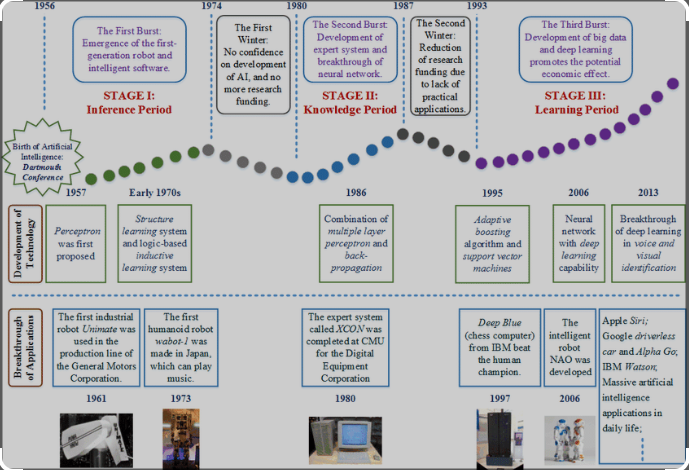
The Transformative Effect of AI in Business Management
AI is revolutionizing business management, transforming companies from reactive entities into proactive innovators. Below, we highlight the key points you need to know about the profound impact of AI on business management:
Present-Day Necessity: AI is no longer a novelty but a critical component for businesses aiming to succeed in a digital and competitive marketplace.
Operational Efficiency: AI technologies like machine learning, natural language processing, and robotics enhance efficiency in various business operations.
Customer Interaction: AI enables personalized customer experiences, using tools such as chatbots and virtual assistants to provide 24/7 support and learn from every interaction.
Predictive Analytics: AI helps businesses anticipate market trends, understand customer behavior patterns, and make data-driven decisions that foster growth and innovation.
Innovative Supply Chains: AI algorithms optimize supply chains, predict maintenance issues before they arise, and manage inventory with exceptional precision.
Transformative Impact: AI transforms businesses from reactive entities into proactive innovators, capable of anticipating changes and responding swiftly.
McKinsey's Insights: Emphasize that understanding and utilizing AI is essential for success in today's business landscape.
These points illustrate that AI's role in business management is not only transformational but fundamental to future success.
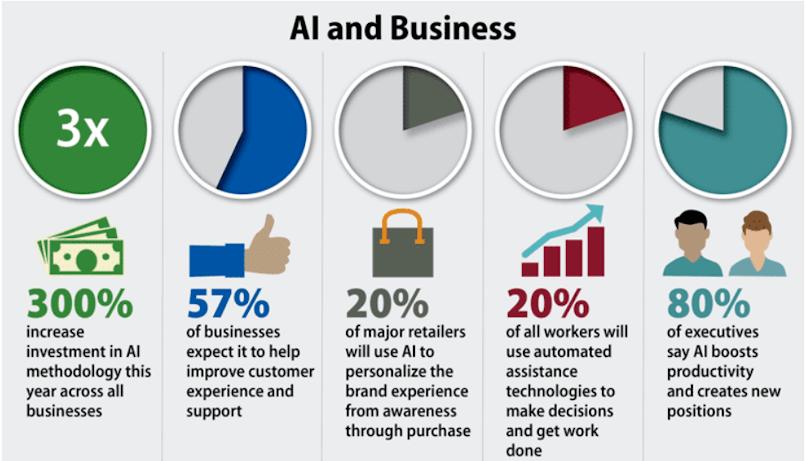
How Artificial Intelligence Is Transforming Decision-Making and Business Operations
Artificial Intelligence has had a profound effect on business management, drastically altering core functions to become more data-driven and adaptable to changing market dynamics. Let's explore its effect on decision-making and operational efficiencies.
Revolutionizing Decision-Making with Data-Driven Insights
AI has grown increasingly critical to decision-making processes. AI systems analyze vast datasets fast and precisely, providing previously inaccessible insights. Its predictive analytics empower businesses to forecast trends, customer behaviours, and market changes exactly, thus decreasing uncertainty when making decisions.
AI tools can identify customer patterns and preferences to inform marketing strategies that better suit each customer segment. AI-powered sentiment analysis offers real-time insights into customer sentiment across platforms, helping businesses respond quickly with any necessary adjustments to strategies.
If you wish to dig deeper into AI's role in improving strategic decision-making processes, explore our past article on ChatGPT for Data Analysis for a deeper insight.
Boosting Operational Efficiency with AI-Driven Automation
Operational efficiency is a major benefit of integrating AI into business management. Through intelligent automation and Robotic Process Automation (RPA), AI streamlines workflows reduces manual labour, and optimizes resource allocation, thereby increasing productivity and cutting costs.
In supply chain management, AI's impact is significant. AI algorithms analyze data from various touchpoints, predicting demand surges, identifying bottlenecks, and suggesting optimal inventory levels. This ensures product availability, minimizes costs and enhances customer satisfaction.
The AI UX Design Review demonstrates how AI-driven solutions are utilised in UX design, by automating the design audit process, providing data-driven insights, and enabling personalized interactions.
AI's transformation of core business functions underscores a shift toward data-driven management. Leveraging AI for decision-making and operational efficiency helps businesses navigate modern market complexities with agility and precision, enhancing competitiveness and setting new standards.
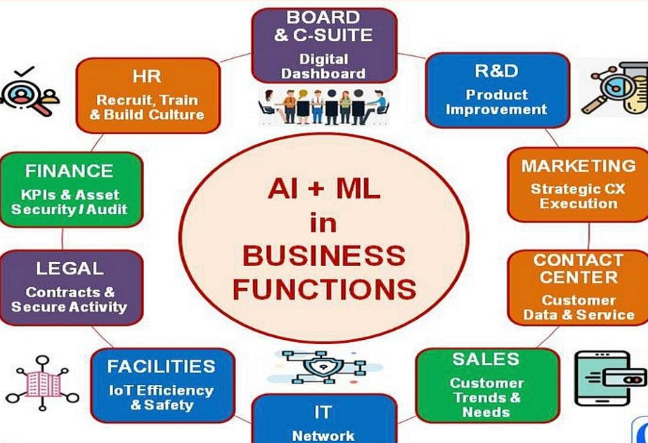
Top 5 AI Business Management Tools
Here are five unique AI tools for business management, each described with their key features:
1. MonkeyLearn
MonkeyLearn is an AI tool designed to automate text analysis tasks, making it easier for businesses to extract meaningful insights from large volumes of text data. It analyzes customer feedback, social media posts, and emails, transforming raw data into actionable insights.
Key Features:
Sentiment Analysis: Understand customer emotions and attitudes from text data.
Data Categorization: Automatically categorize and tag data for better organization and trend spotting.
Customizable Models: Create and train custom models to suit specific business needs.
Integration: Seamlessly integrates with tools like Zapier, Google Sheets, and more.
User-Friendly Interface: Intuitive setup and usage, suitable for users with minimal technical expertise.
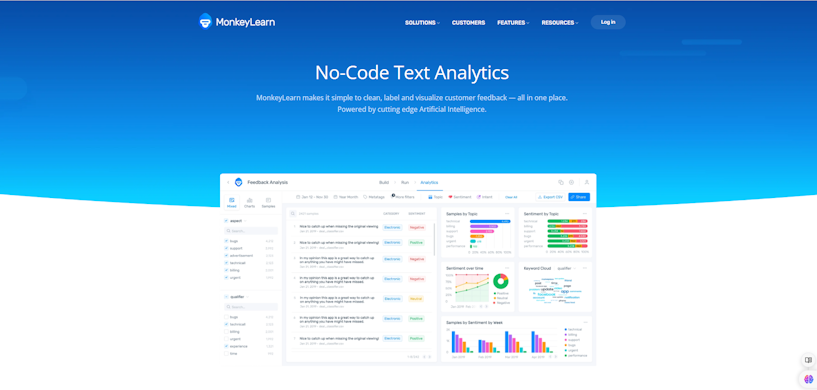
2. Deepgram
Deepgram is an AI-powered speech-to-text tool that excels in transcribing audio and video content quickly and accurately. It is particularly useful for sectors like education, media, legal, and entertainment, where converting speech to text is essential.
Key Features:
High Accuracy: Uses deep learning models trained on vast datasets for accurate transcription.
Multi-Language Support: Recognizes multiple languages and dialects.
Real-Time Processing: Converts speech to text in real-time, ideal for live events and broadcasts.
API Integration: Easily integrates with existing applications through APIs.
Noise Handling: Effective in recognizing words even in challenging audio environments.
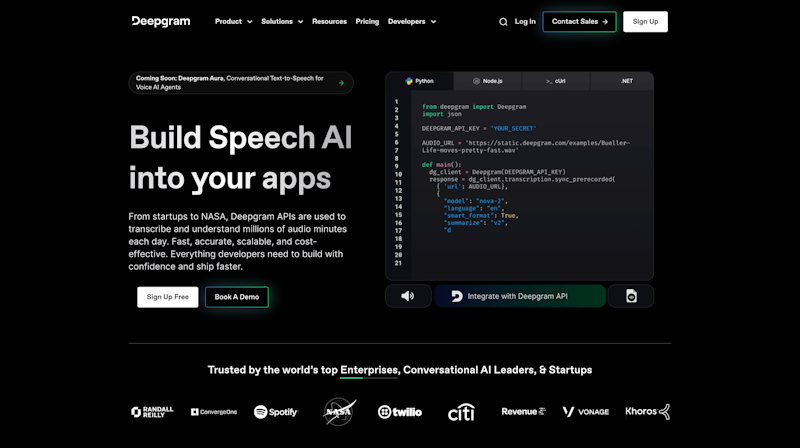
3. Synthesys
Synthesys is a leading AI tool for creating AI-generated videos and voiceovers, allowing businesses to produce high-quality media content without the need for extensive resources.
Key Features:
Text-to-Video Technology: Converts scripts into dynamic video presentations.
AI Avatars: Offers 69 real “Humatars” and over 254 unique voice styles.
Multi-Language Support: Supports 140+ languages for global reach.
User-Friendly Interface: Simple editing and rendering process.
High-Resolution Output: Produces professional-grade videos suitable for various platforms.
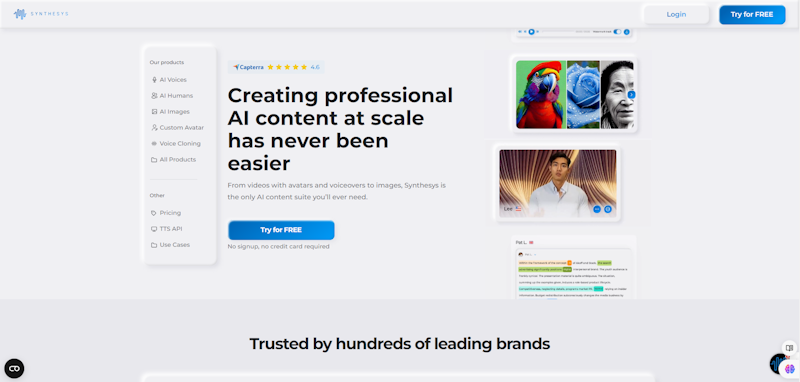
4. Clara
Clara is a virtual assistant who specializes in scheduling meetings and managing business communications. By automating the scheduling process, Clara frees up valuable time for employees.
Key Features:
Automated Scheduling: Schedules meetings by participating in email threads.
Natural Language Processing: Understands and processes rescheduling and cancellation requests.
Integration: Integrates with calendar applications to avoid conflicts.
Customizable: Allows users to add signatures and titles to emails.
User-Friendly: Simple setup and easy to use, requiring minimal intervention.

5. IBM Watson
IBM Watson is a suite of AI tools designed for data analysis, natural language processing, and business process automation. It is especially known for its robust capabilities in handling large volumes of unstructured data.
Key Features:
Natural Language Processing: Analyzes text, images, and audio for comprehensive insights.
Machine Learning: Builds, trains, and deploys machine learning models.
Cognitive Computing: Simulates human thought processes to solve complex problems.
Data Visualization: Creates interactive visualizations to identify patterns and trends.
Scalable Solutions: Suitable for various industries, including healthcare, finance, and marketing.
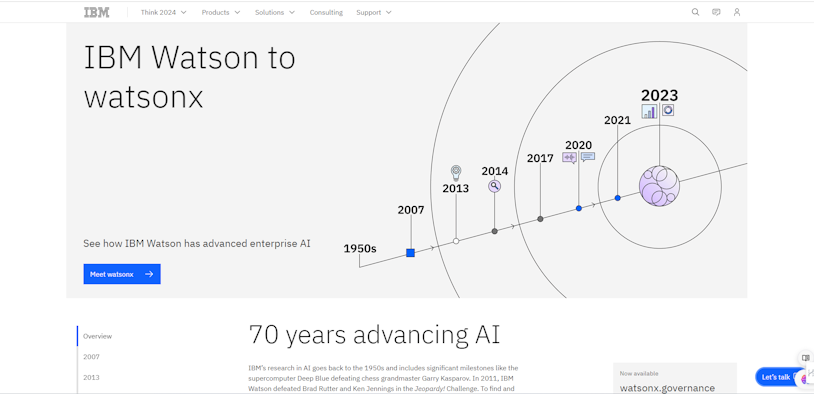
These tools offer diverse functionalities that can significantly enhance business management by automating tasks, analyzing data, and improving decision-making processes.
Understanding and Overcoming Challenges of Integrating AI in Business Management
As exciting as AI in business management indicates an exciting era of efficiency and innovation, it comes with its own set of challenges. From technical to financial to ethical and cultural obstacles, adopting AI requires careful thought and careful strategic planning for optimal success. Let's explore some of the common challenges encountered when adopting AI as well as effective ways to overcome them.
Barriers to AI Adoption and Implementation
One of the main barriers to AI adoption is its technical complexity and high capital investment. Implementing AI requires a robust IT infrastructure, extensive data, and skilled personnel to manage AI systems—challenges that can be overwhelming for small- and medium-sized enterprises (SMEs).
Additionally, AI adoption necessitates an organizational culture shift toward data-driven decision-making and continuous learning. Employee resistance due to fears of job displacement or scepticism about AI's effectiveness must be addressed through open communication, training programs, and demonstrating how AI can enhance, rather than replace, job roles.
Are you a startup looking to beat this hurdle in your journey? This previous article AI Startups offers insights into how to employ AI to create innovative solutions while controlling costs and cultivating an atmosphere of creativity and adaptability.
Ethics and AI Governance in Business Management
As AI becomes essential to business processes, ethical considerations like privacy, data security, bias in algorithms, and accountability for AI-driven decisions become crucial.
Ethical guidelines and governance must ensure AI systems remain transparent, fair, and aligned with societal values. Businesses must also comply with evolving regulations such as GDPR, demanding meticulous data management and transparency about AI data usage.
Exploring the AI UX Research Trend emphasizes the importance of user-centric design and ethical AI use, respecting privacy and promoting inclusion.
Navigating AI integration challenges requires balancing technical innovation with ethical responsibility and cultural adaptability, unlocking AI's potential to improve efficiency, drive growth, and gain a competitive edge in the digital age. While the journey is complex, its benefits for forward-thinking organizations are undeniable.
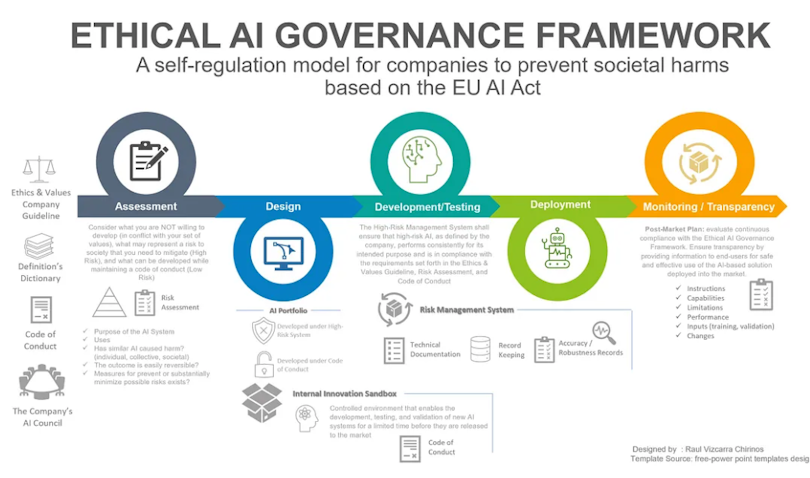
Case Studies and Real-World Applications of AI in Business
The theoretical advantages of AI in business management may be impressive, but its true impact can only be truly appreciated in real-world applications.
Now, we shall dig into two case studies illustrating successful AI integration within customer service and supply chain management operations.
Case Study 1: AI-Driven Transformation in Customer Service
A leading telecom company implemented an AI chatbot to manage customer inquiries, significantly improving service efficiency. Before AI integration, high call volumes caused long wait times and customer dissatisfaction.
The AI chatbot now automates responses for common queries like billing and service disruptions, increasing customer satisfaction.
The chatbot is trained on a comprehensive dataset and accurately comprehends and responds to inquiries. Complex issues are escalated to human agents as needed. This led to a drastic decline in call volumes, improved response times, and higher customer satisfaction scores.
This case study highlights AI's role in enhancing customer service efficiency and responsiveness.
Case Study 2: Optimizing Supply Chain Management With AI
AI has significantly transformed supply chain management for a global retailer managing inventory across hundreds of stores and online channels. By employing AI algorithms, the company analyzed sales data, predicted product demand, and optimized inventory levels instantly.
The AI system considered various factors like seasonal trends, promotions, and local events affecting supply in each store. This precision ensured stores had the right products in the right quantities, reducing stockouts, overstocking, and waste, thereby improving profitability. Additionally, AI insights streamlined logistics and distribution, decreasing delivery times and costs.
These case studies highlight AI's versatility and potential to revolutionize business operations. From enhancing customer service to optimizing supply chains, AI helps businesses tackle complex challenges, boost efficiencies, and drive growth. As more companies adopt AI, business management continues to evolve with data-driven innovation.
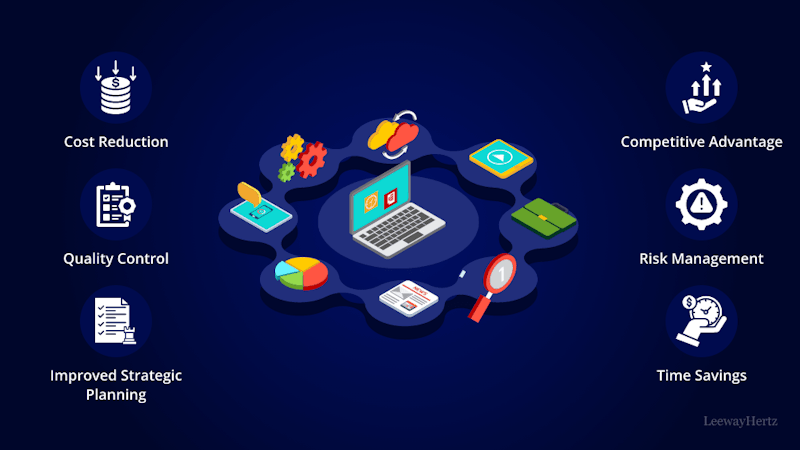
Future Trends of AI in Business Management
As businesses navigate digital transformation, AI remains at the forefront of innovation, continuously reimagining business management. Here are some emerging AI trends poised to revolutionize future business practices:
Autonomous Decision-Making Systems:
Description: These advanced systems go beyond predictive analytics, making real-time decisions by analyzing multiple variables and outcomes.
Impact: They can transform fields like financial trading, inventory management, and strategic planning, where quick, data-driven decisions are crucial.
AI-Driven Process Automation:
Description: AI automates entire business processes, from initiating marketing campaigns based on market conditions to adjusting supply chains in real time.
Impact: This technology frees up human resources for more creative and strategic tasks, enhancing overall business efficiency.
Integration with Blockchain and IoT:
Description: Combining AI with blockchain and IoT technologies can lead to significant business innovations.
Impact:
IoT and AI: AI can analyze IoT data to optimize manufacturing processes and improve product quality.
Blockchain and AI: Blockchain provides a secure, transparent framework for AI operations, increasing trust and compliance.
AI in Financial Trading:
Description: AI systems analyze vast amounts of data to make autonomous trading decisions.
Impact: This leads to faster, more accurate trading decisions, enhancing profitability and market responsiveness.
AI in Inventory Management:
Description: AI optimizes inventory levels by predicting demand based on various data points.
Impact: Reduces overstocking and stockouts, minimizing costs and improving customer satisfaction.
AI in Strategic Planning:
Description: AI helps in formulating and executing strategic plans by analyzing market trends and internal data.
Impact: Enables businesses to adapt swiftly to market changes and stay ahead of competitors.
These trends highlight AI's potential to not only enhance operational efficiencies but also drive strategic growth and innovation, positioning businesses for success in the digital age.
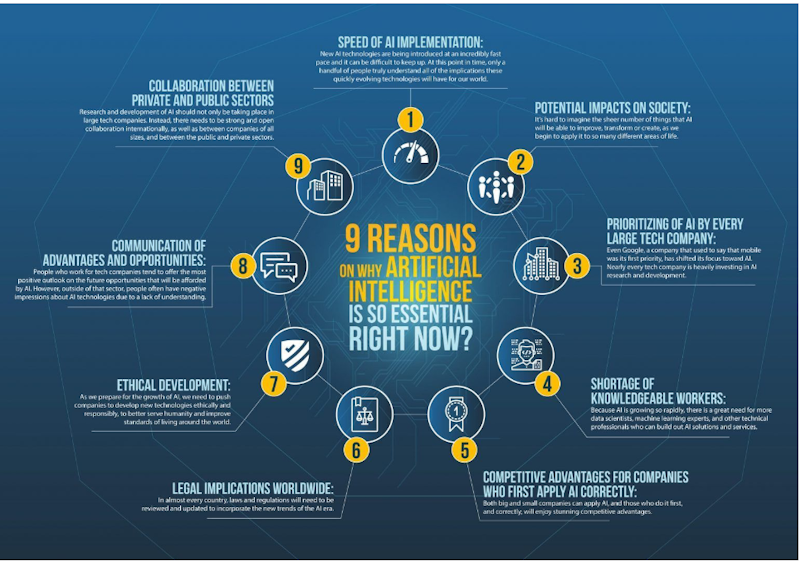
Preparing for AI's Future Impact in Business Management
Businesses looking to leverage the full potential of AI technologies must prepare themselves for their impactful application by investing in both technology and developing the skills and culture necessary for effectively integrating AI into their operations.
Businesses should prioritize data literacy and AI education within their organization to ensure employees can efficiently work alongside AI technologies. Fostering an environment of innovation and adaptability will also be essential as businesses adapt to AI's rapid pace of change.
Accenture's discussion on ethical considerations in AI deployments emphasize that implementing robust data governance and ethical AI practices will be essential as businesses rely more on AI for decision-making. By upholding transparency, fairness, and accountability in AI operations, businesses can build trust with stakeholders while mitigating risks associated with the adoption of this technology.
Conclusion
As we approach an AI-led future, the possibilities in business management seem boundless. AI will transform businesses by automating complex processes and uncovering insights that drive innovation. Companies that prepare for AI integration will lead in the new era of digital business management.
Adapting to emerging AI trends and anticipating their effects can open new avenues for growth, efficiency, and competitive edge. AI is already revolutionizing decision-making and improving operational efficiencies through automation.
Real-world case studies show AI's tangible benefits, such as enhancing customer service and optimizing supply chains, proving AI's potential to solve complex business challenges and improve profitability.
Future technologies like autonomous decision-making systems and AI-driven process automation will further elevate AI's strategic role, unlocking new opportunities for innovation. However, integrating AI presents challenges; businesses must address technical hurdles, and ethical considerations, and foster an environment conducive to innovation.
Embracing AI offers a distinct edge in managing operations. By improving decision-making, operational efficiency, and customer engagement, businesses can navigate the complexities of the digital age with greater agility. The future of business management lies with AI innovations, and leaders must explore, adapt, and innovate AI initiatives to stay ahead in this technological revolution.




